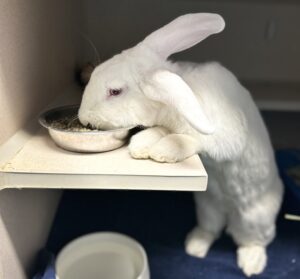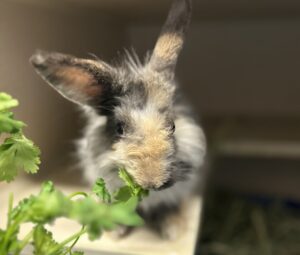
It’s Easter time, and there are bunny-themed items everywhere. From plush bunnies to chocolate bunnies, this cute creature is signature of the season. Although parents might be tempted to get their kids a real rabbit for Easter, experts warn that bunnies aren’t as easy to care for as you might think. It’s important to know what pet rabbits need before you bring one into your home.
Pet rabbits have grown in popularity in recent years. But they’re also the third most abandoned animal in the country, after dogs and cats. A broad misunderstanding about bunnies unfortunately leads to abandonment, neglect and even death for some rabbits.
It can be especially grim for rabbits come springtime. According to the advocacy group, Abandoned Rabbits, studies have shown that about 80% of rabbits purchased at Easter die or are abandoned before their first birthday. Children lose interest, and the pet becomes a financial and time-consuming burden to parents. The next stop for bunny? Often, an overcrowded shelter or the streets, where domestic rabbits aren’t built to survive like their wild counterparts.
Good News for New York Bunnies
But in New York, there’s some good news at the end of this dark bunny trail, thanks in part to local legislation. NYC’s Animal Care Centers—the open admission shelters for the city—have seen a solid decrease in rabbit surrenders since a law passed in 2015 banning the sale of pet rabbits in city pet stores. Additionally, a state law banning the sale of rabbits, dogs and cats at pet stores will take effect in 2024.
“Dogs, cats and rabbits across New York deserve loving homes and humane treatment,” Governor Kathy Hochul said in a press release announcing the law in December. “I’m proud to sign this legislation, which will make meaningful steps to cut down on harsh treatment and protect the welfare of animals across the state.”

Animal Rescues and Shelters Raise Awareness: What Pet Rabbits Need
Animal rescue groups and shelters often do their part, too, by raising awareness about the commitment involved in owning a rabbit. One of their key messages is that rabbits aren’t meant to be given as gifts around holidays and shouldn’t be considered easy to take care of.
“It’s not a problem to adopt at any time,” Paul Sanders, senior administrator of government and community affairs at ACC, said. “What’s problematic is if the leading reason is because it’s Easter. With any animal, whether it’s a rabbit, guinea pig, dog, cat, it’s a lifetime commitment of that animal. And that goes beyond a holiday.”
Even though laws are in place and compassionate people raise awareness about bunny care, there are still rabbits in rescues and shelters, including ACC sites, who need homes. This is true during Easter and throughout the year. Sanders wants all ACC bunnies to find good, loving homes. But, he also wants New Yorkers to do their research before they adopt—and not adopt on impulse.
“Rabbits need care. They need to have a certain amount of space. They need exercise. You can’t leave them in a cage and just be like, ‘oh, Easter’s over, the novelty has worn off,’” Sanders said.
There is a fee to adopt an animal at ACC, which has full-service care centers in Staten Island, Manhattan and Brooklyn. But staff works with potential adopters to make sure they have all the important information they need for a successful adoption.
“The nice thing about ACC is that when you do adopt from us, you’ll get medical information, a small starter kit for adoption, and the knowledge and experience of our staff,” Sanders said. “We’ll sit down with you. We’ll coach you and have a conversation to talk about all things you need to do to set you up for success. And also to set the rabbit and anyone else living in your household up for success.”
Rabbits as Wonderful Pets
The growing number of pet rabbit owners across the country will mostly agree that these animals make wonderful pets and family members. Just like cats and dogs, they each have their own unique personalities. They can be friendly, silly, snippy, quirky, sassy, smart, carefree—and always adorable.
Missy Reinheimer has been raising rabbits for more than 20 years and educates about what pet rabbits need.
“My raising of house rabbits for about 23 years now has given me a genuine passion for them,” said Reinheimer. “My goal is to help people understand that rabbits are not gifts or throw-away pets.”
Reinheimer also advocates for the adoption of elderbuns—rabbits who are well into the tweens and teens. These older bunnies can be expensive to care for. But, they have an easy-going personality that makes them less likely to cause house damage from chewing. She discussed what pet rabbits need in their golden years.
“Elderbuns require a bit more care and can be much more expensive if they have underlying issues or special needs. Dental problems are something to keep a close eye on,” Reinheimer warns. “Most elder buns have a mellow temperament and are much less likely to chew or cause damage that their younger counterparts can.”

What to Know When You’re Ready to Adopt a Rabbit
The rabbit and animal experts we spoke to shared information about what pet rabbits need to be happy and healthy. Here’s what you need to know if you’re ready to sign those adoption papers:
- Diet and nutrition. Rabbits follow a diet that includes an unlimited amount of Timothy hay and water, and select vegetables as snacks in moderation.
- Expect a 10-year commitment. Rabbits can live in excess of 10 years if properly housed and cared for. The past decade or so has demonstrated an increase in the longevity of rabbits. Their rising popularity as household pets has given veterinarians greater knowledge about their health.
- Rabbits will chew anything—anything! Did you know that a rabbit’s teeth never stop growing? This gives them a natural instinct to chew and gnaw. Rabbits will chew anything: carpets, walls, baseboards, furniture, and electrical cords are all prime targets for rabbits. Hiding your cords will protect your electronics and your bunny from potential harm. Ask a rabbit owner for tips on how to bunny-proof your home. There are a lot of ingenious and creative solutions out there.
- They can’t live in a cage all day. Rabbits need lots of space to run, hop and play. If you can’t have bunny take over your entire home, make sure that they at least have a dedicated space. Even a blocked off, protected section of a room that is just for them is a good idea.
- They can be litter box trained! You might be wondering where a bun does his business if he’s free roam all day. But the good news is they can use a litter box just like cats!
- Find a rabbit-savvy veterinarian before getting a bun: Many people get a bunny first and then scramble to find a vet when something goes wrong. Since a rabbit’s health can decline quickly, it is often too late to save the bunny, and the family has to go through the terrible grief of losing a beloved pet. Make sure that you have a veterinarian who is highly-versed in rabbit medicine. This will ensure that your new companion is in the best of hands if something goes wrong.
Love small animals? The NYC ACC has many adorable guinea pigs available for adoption, and they all need loving homes. To learn more about adopting a pet in NYC, visit nycacc.org or follow the ACC on Facebook or Instagram.







